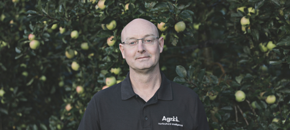
Two-year study supports increased role for biological fungicides in strawberry production
News - 06.09.22
The number of synthetic fungicides required to control the main diseases in a strawberry trial was reduced by 58% while crop quality improved through reduced plant stress.
A two-year trial performed by crop advisers and trials specialists at Agrii has demonstrated the potential contribution biological products can make in maintaining high crop quality and yield while controlling powdery mildew (Podosphaera aphanis) and storage rots in commercial strawberry production.
The trial, which was jointly supported by manufacturers Bayer Crop Science and Certis Belchim, incorporated commercially available biological fungicides into a programme for comparison with one based entirely on conventional products. Until now, biological products have only been assessed in isolation.
The integrated programme performed impressively well, explains Emily Dimond, Agrii fruit agronomist who managed the trial.
“In both 2021 and 2022, strawberries produced under the integrated programme were bigger and heavier than those receiving only synthetic fungicides. There were no negative effects on firmness or Brix scores either,” Emily Dimond said.
The trial used the variety Malling Centenary with crops planted in March and grown on
Trial crops were planted in a polyhouse with a drip irrigation & fertigation system.
tabletops in a polyhouse with a drip irrigation and fertigation system reflective of the industry standard. Spray applications were performed every seven days, as per standard commercial practice. A flexible approach to application timing allowed for seasonal differences in crop growth to be reflected while crops remained protected throughout the production period. As a result, crops received 14 sprays in 2021 and 12 in 2022. In both years, conventional products accounted for five sprays of the programme.
The crop produced under the integrated programme (right) yielded more Class 1 fruit than that grown under a standard programme based on synthetic fungicides (left)[/caption]
The trial proved that it is possible to meet yield and quality targets with the structured use of biologicals, however, this was not the only finding.
“Over two years, the average size and weight of the strawberries was greater in the integrated programme by 7% and 14% respectively (compared with the conventional programme). This is likely to be a benefit of reduced crop stress and improved crop condition,” Miss Dimond said.
Shelf-life assessments based on storage for seven-days at ambient temperatures considered the incidence of storage rots, such as Botrytis, penicillin, rhizopus and mucor. In both years, the incidence of storage rots reflected the disease pressure during the season, but in most cases the amount of healthy fruit was significantly greater in the integrated programme.
“Our investigations have shown that the shelf-life potential of the crops grown under the integrated programme was significantly greater. This will be of great interest to growers, buyers and retailers,” Miss Dimond said.
“In this trial, the integrated programme had a harvest interval of one day, which was one-third of that of the conventional programme. The reduced re-entry and harvest intervals associated with biologicals will be of considerable value to growers allowing tighter crop harvests through the season. This means crops can be picked at optimum ripeness, which will support crop quality and potentially reduce the risk of spotted wing drosophila (SWD) infestations and disease,” Miss Dimond added.
There was a noticeable difference in fruit appearance between the programmes. Fruit grown under the integrated programme was of a medium red colour with fewer observable seeds while the conventional programme tended to result in fruit that was darker in appearance with evidently more seeds after seven days in ambient storage.
Residue tests found zero residues in the integrated programme while those in the conventional programme were within regulatory limits. The trial will continue for an additional year to generate further data and refine the programme before being shared with growers and buyers.
Join Our Community

Agrii X
We love engaging with clients and partners. Give us a follow and let's share stories for the community.

Agrii Instagram
A picture paints a thousand words. Follow us on Instagram to see what we are up to.

Agrii Facebook
Follow us on the worlds biggest social media site for the latest news and events straight to your feed.

Agrii LinkedIn
If you are all about the business, connect with us on LinkedIn to build your network
Stay In Touch

Newsletter Sign-Up
Receive email updates on topical news and information from around Agrii and UK Farming.

Listen To Our Podcasts
Listen to the Tramlines Podcast. Fortnightly chat about agriculture and trials with your host Tony Smith.

Agrii Insights
Read essential agri intelligence for profitable farming.

Find an Event
Join us for our upcoming events and tours.





